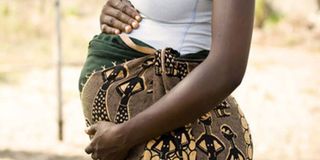Parents should take responsibility for the surge in teen pregnancy

What you need to know:
During the Covid-19 pandemic onslaught, there have been statistics flying around on escalated teen pregnancies, especially the recent 2,467 from Kabale and 17,000 from Northern Uganda
The household is the smallest unit of a society and is commonly used by Economists in micro-economic surveys and analysis. It is where individuals eat meals prepared from the same pot/ kitchen and the individuals’ welfare are managed by the heads of the households who are either both / single parents. It is expected that these household governors superintend over the household economy; its health, housing, water and sanitation, sexual and reproductive health issues, energy, life skills, education, production, spirituality, and politics.
During the Covid-19 pandemic onslaught, there have been statistics flying around on escalated teen pregnancies, especially the recent 2,467 from Kabale and 17,000 from Northern Uganda. These figures are scary, to say the least. At 25 per cent, Uganda’s teen pregnancy may seem low when compared with sub-Sahara’s 28 per cent. Parents have a God-given duty to procreate and nurture their young. This teen pregnancy, which has escalated during the Covid-19 era, is happening under the watchful eye of these parents who are confined at home!
The challenge of parents of nowadays is that at day break the males sneak to hang out with their male counterparts and have shamelessly drawn in the roadside as their new hang-out. These parents, by their own doing, have made the household not conducive for them to even spend a minute; they sneak out at day break without even taking breakfast and scramble for breakfast on the roadside. In Nebbi, where I come from, it is the popular “anyoya” which is a mixture of boiled dry beans and maize. This behaviour borders selfishness on the part of mainly the males who care less about what breakfast the household economy feeds on. The parents have run away from providing the prescriptions in Maslow’s bottom of the pyramid – physical /basic needs. This is shameful. In 2019, before Covid-19 showed up, when I was in Lango Sub-region for research, I came across a group of this lot of parents, who were camped on the road-side in a makeshift. As to why they were idle around a roadside like counting motorists passing while the sun sets, these parents reasoned that they are on a forced holiday. To them the absence of rain meant that there was nothing else they could do under the sun until the rains come again. This is where the problem starts. In the rural household, everyone is on one’s own; the household is now used for convergence to sleep, only to disappear in the morning. There is no sense of sharing ideas, mentoring, solving life skills challenges facing the adolescents.
There is aggression and extreme violence meted when a child requests a parent for small sums of cash to procure anything, even sanitary ware. These scuffles are normally reported in the evenings and nights thereby coinciding with the male parents who return home very drunk.
The real problem solvers of the girl child is the males who can readily avail transport and cash to offset some needs, be it mandazi, roast meat, sanitary wear. These pregnancies are accidents of “rewards to boys who care” for such girls’ plight.
After government has provided the road, water points, education facilities, health facilities, security, wealth funds, it is unpatriotic to expect government to monitor the growth of children at the various households across the country.
At this rate, probably the Ministry of Gender, Labour and Social Development could revisit engaging communities through public dialogues (barazas) to transform the mindset around teen welfare and their sexual reproductive rights.
Pascal Odoch, PhD.




